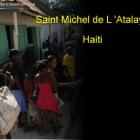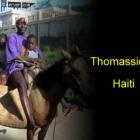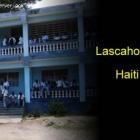kreyòl ayisyen or Haitian Creole, a fusion of other languages
ADVERTISEMENT
The slaves who arrived later had little contact with the French speakers; they learnt an approximative variety of Popular French that their other fellow slaves have so far developed and spoke. Over time, this approximative variety of French became more and more distant from its origin and came to be recognized as a distinct language with own unique identity named "Creole"-- with a distinctive vocabulary and a unique grammar system. They started using French words, but arranged them in a different structural grammatical form-- in ways more familiar to their own grammars and sentence structures.
Thus, it is not surprising that more than 90% of the Creole vocabulary are of French origin. Haitian Creole evolved in this way from a combination of French and several African languages like Fon, Ewe and Wolof. The grammar of Creole has been just as simple or complex that of French or English and its vocabulary meets all the needs of its speakers and writers today.
Read more: Creole, Haitian Creole, Education, Culture
« The UPS Foundation to help fund YMCA d'Haiti Literacy Program | Main | Over 60% of schools in Haiti have no drinking water or toilet »
Leave a Reply
Name (required) E-mail (required, will not be published)
» »
Our objective is to share with you news and information about Haiti and the people of Haiti. Traditions, habits and the way we were or grew are alive in this site. We highly recommend that you Subscribe to our Newsletter and also share with us some of the things that are memorable and made us unique people.


 Saint Michel de L 'Atalaye
Saint Michel de L 'Atalaye  Haitians are a Proud People
Haitians are a Proud People  Battle of Vertieres
Battle of Vertieres  Thomassique, Haiti
Thomassique, Haiti  Lascahobas, Haiti
Lascahobas, Haiti